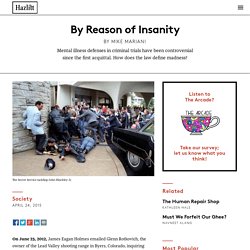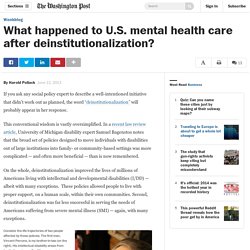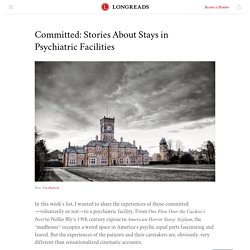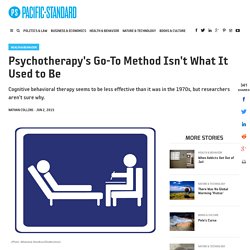

Resilience. The existential quest of psychological science for its soul.
Stockholm Centre for the Ethics of War and Peace. Suzanne Broderick, "Real War vs. Reel War: Veterans, Hollywood, and WWII" (Rowman and Littlefield, 2015) Mental Hospital by Country. By Reason of Insanity. “Key, you scoundrel, you have dishonored my house—you must die!”

Shouted United States Congressman Daniel Sickles on February 27, 1859, as he shot Philip Barton Key, U.S. attorney and son of the author of the “Star-Spangled Banner,” with three different pistols in broad daylight in direct view of the White House. A few days earlier, Sickles had received an anonymous letter. By Reason of Insanity. On June 25, 2012, James Eagan Holmes emailed Glenn Rotkovich, the owner of the Lead Valley shooting range in Byers, Colorado, inquiring about becoming a member.

The Vanishing of America’s Historic Mental Asylums. Greystone Park Psychiatric Hospital in 2011 (photograph by Jere Waldron, via Flickr) Between 1848 and 1890, dozens of grand mental asylums were built around the United States under the Kirkbride Plan, designed by Thomas Story Kirkbride.

An architecture of fresh air and sunlight offered a very different curative approach from the crowded facilities that characterized earlier mental health treatment facilities. What happened to U.S. mental health care after deinstitutionalization? If you ask any social policy expert to describe a well-intentioned initiative that didn't work out as planned, the word “deinstitutionalization” will probably appear in her response.

This conventional wisdom is vastly oversimplified. In a recent law review article, University of Michigan disability expert Samuel Bagenstos notes that the broad set of policies designed to move individuals with disabilities out of large institutions into family- or community-based settings was more complicated — and often more beneficial — than is now remembered. On the whole, deinstitutionalization improved the lives of millions of Americans living with intellectual and developmental disabilities (I/DD) — albeit with many exceptions.
These policies allowed people to live with proper support, on a human scale, within their own communities. Second, deinstitutionalization was far less successful in serving the needs of Americans suffering from severe mental illness (SMI) — again, with many exceptions. Committed: Stories About Stays in Psychiatric Facilities. In this week’s list, I wanted to share the experiences of those committed—voluntarily or not—to a psychiatric facility.

From One Flew Over the Cuckoo’s Nest to Nellie Bly’s 19th century expose to American Horror Story: Asylum, the “madhouse” occupies a weird space in America’s psyche, equal parts fascinating and feared. But the experiences of the patients and their caretakers are, obviously, very different than sensationalized cinematic accounts. 1. “Something More Wrong.” How $100 million in cuts created chaos in Florida's mental hospitals. Many nights, Tonya Cook made her rounds alone.

She walked the halls of one of Florida’s most dangerous mental hospitals clutching her clipboard to her chest, trying not to think too much about the patients in her care. All of them were men. Many were schizophrenic, violent. One had chopped up a diabetic amputee and scattered him in parts through the woods of Dixie County. One night in 2012, she walked the ward again, a single orderly watching over 27 men.
Library of Dust. General Psychology. Re-conceptualizing Neurosis as a Degree of Egocentricity: Ethical Issues in Psychological Theory. Psychotherapy's Go-To Method Isn't What It Used to Be - Pacific Standard. Since it was first developed, cognitive behavioral therapy (CBT) has seen its share of controversy.

It's also become one of the go-to techniques for treating depression, anxiety, and some psychiatric disorders. But a new study questions whether it's still doing much good: It seems the benefits of CBT are in decline. Why We Need to Abandon the Disease Model of Mental Health Care. The views expressed are those of the author and are not necessarily those of Scientific American.

The original English version of the DSM-5 as well as the French version of the DSM-IV-TR. (Credit: F.RdeC via Wikimedia Commons) The idea that our more distressing emotions such as grief and anger can best be understood as symptoms of physical illnesses is pervasive and seductive. But in my view it is also a myth, and a harmful one. Our present approach to helping vulnerable people in acute emotional distress is severely hampered by old-fashioned, inhumane and fundamentally unscientific ideas about the nature and origins of mental health problems. Why Did the American Psychological Association Approve Its Members to Oversee Torture? - Pacific Standard. The Consequences of Psychology’s Shameful Collusion in Torture - Pacific Standard. Amid the scandalous conclusions in the recent Independent Review Report about the American Psychological Association’s collusion with the torture programs of the Central Intelligence Agency and the Department of Defense, a relatively mundane claim grabbed my attention.

In one sense, the report merely confirmed what those who follow the news already knew, even if we didn’t have all the salacious details: Psychologists played a crucial role in developing and implementing torture techniques, in part by twisting the ethics policy of the APA in order to make it “ethical” for psychologists to participate in torture. The report, however, identified a “secondary motive” for contorting the field’s professional ethics: “to foster the growth of the profession of psychology by supporting military and operational psychologists.” How Unethical Behavior Becomes Habit. When a former client’s secretary was arrested for embezzlement years before his own crimes were uncovered, Bernie Madoff commented to his own secretary, “Well, you know what happens is, it starts out with you taking a little bit, maybe a few hundred, a few thousand.

You get comfortable with that, and before you know it, it snowballs into something big.” We now know that Madoff’s Ponzi scheme started when he engaged in misreporting to cover relatively small financial losses. Over a 15-year period, the scam grew steadily, eventually ballooning to $65 billion, even as regulators and investors failed to notice the warning signs. Watch Psychology Documentaries Online Free. This Fifth Estate documentary was filmed in 1994 and is about a troubled 11 year old called Evan and his family. 5 films that do a good job of exploring mental illness. Film doesn’t often do mental illness well. When it comes to Hollywood, the bigger the budget, often the more offensive the attempt. Whether it’s a release from 2015 or 1955, scripts are frequently terrible, insensitive and fairly inaccurate in their depictions of conditions, perpetuating negative stereotypes.
Throughout cinematic history, the mental health patient has been assigned the stock murderer, the mad, or the bad. Mental health workers don't recognise their own burnout. Some mental health workers find it difficult to recognise their own burnout and even when they do they struggle to admit it to others says a study presented today at the British Psychological Society Division of Occupational Psychology annual conference in Glasgow. The study was undertaken by lecturer at University at Notre Dame, Australia Ms Marieke Ledingham and colleagues Associate Professor Peter Standen (Edith Cowan University, Australia) and Associate Professor Chris Skinner (University of Notre Dame, Australia). Ms Ledingham explained: “Burnout has long been a problem in mental health workplaces and remains so despite much research and considerable knowledge of it amongst professional employees.
Despite working in this sector employees struggle to avoid burnout and we wanted to study how work places could improve support.” Participants were predominantly older female workers with 60 per cent aged 40 and over, including 33 per cent of these aged over 50. What it's really like to be a suicide prevention hotline operator. Photographed by Rockie Nolan. In honor of National Suicide Prevention Week, which runs from September 7-13, 2015, Refinery29 has produced a series of stories that delve into what it’s like to work at a suicide hotline, current research into the most effective suicide-prevention strategies, and the emotional toll of losing a family member to suicide.If you or someone you care about is thinking about suicide, please call the National Suicide Prevention Lifeline at 1-800-273-TALK (8255) or the Suicide Crisis Line at 1-800-784-2433.
Danielle* is a 42-year-old high school teacher with a reputation for asking her students about their emotions. "I’m often the one that says, 'Well, how do you feel? '" she shares. The F Scale: Final form. The difference between a psychopath and a sociopath. Most of us, fortunately, will never meet a Hannibal Lecter, but psychopaths and sociopaths certainly do exist. And they hide among us. Sometimes as the most successful people in society because they’re often ruthless, callous and superficially charming, while having little or no regard for the feelings or needs of others. These are known as “successful” psychopaths, as they have a tendency to perform premeditated crimes with calculated risk.
Or they may manipulate someone else into breaking the law, while keeping themselves safely at a distance. They’re master manipulators of other peoples’ feelings, but are unable to experience emotions themselves. Sound like someone you know? Post-traumatic stress 'evident in 1300BC' 24 January 2015Last updated at 02:40 ET By James Gallagher Health editor, BBC News website Evidence of post-traumatic stress disorder can be traced back to 1300BC - much earlier than previously thought - say researchers. The team at Anglia Ruskin University analysed translations from ancient Iraq or Mesopotamia. For This Alone, Mogg. The Death of Robin Williams, And What Suicide Isn't. I was coming home from a long day of working when I saw the news on Twitter. Today, probably sometime this morning, Robin Williams, beloved American actor, passed away in his California home.
Why Men Kill Themselves - Pacific Standard. ‘I Don’t Believe in God, but I Believe in Lithium’ Schizophrenia In America. Why more white-collar workers are at risk for suicide. Still Visible: William Styron's Memoir of Madness 25 Years Later. #NoShame in Mental Illness: A Reading List. Even though I’ve lived with mental illness for years, I’m still learning about self-care, support systems and valuable resources. One of these resources is No Shame Day, initiated by poet and mental health advocate Bassey Ikpi. Ikpi founded The Siwe Project, which provides special mental health support for the Black community and other minority groups. The Suicide Project - Share your suicide stories. Let's talk mental health.
The 911 Operator Who Needed Her Own Lifeline. Thandie Newton: Embracing otherness, embracing myself. Psychology & Space Exploration (ebook) 10 Psychological Experiments That Went Horribly Wrong. Policy: Twenty tips for interpreting scientific claims. Replication studies: Bad copy. Replication, falsification, and the crisis of confidence in social psychology. Tea and Skeletons - Lauretta Bender is perhaps best known for devising... Psychosurgeons Use Lasers to Burn Away Mental Illness. Uncovering The Secret History Of Myers-Briggs. Home - Are You Daydreaming Your Life Away? Madness Radio: Ethical Therapy Toby Watson. Will Hall at Unitarian Church Vancouver Canada March 2012 - Transcript. “Model Minority” Pressures Take Mental Health Toll. The Dangerous Weight of Expectations. The man who couldn’t speak—and how he revolutionized psychology. Biomedical Ephemera, or: A Frog for Your Boils — I don't want to interrupt this height party, but what are your thoughts on Phineas Gage?
Teaching Children the Skill of Grieving. How To Talk To A Grieving Person 5 Ways to Make Progress in Evolutionary Psychology: Smash, Not Match, Stereotypes. “One Abuse Script with Many Faces” Abuser psychology. The Pervocracy Guide To Not Doing Stupid Things Because You're Angry. The Questions People Asked Advice Columnists in the 1690s. When Doctors Discriminate. Emotional abuse is as harmful as physical abuse, says new study. Virtual reality improves offenders' empathy. Psychologist Locator. Active Minds. An Online Crisis Network. Black Dog Institute - Home - Black Dog Institute. How to locate low-cost mental health care in the US and Canada (Guest Post!)
Trans Lifeline - (877) 565-8860 - Transgender Crisis Hotline. Depression: Suicide Hotline: 1-800-SUICIDE (2433)... - The Tarot Sybarite. Brain Self-Help: An Incomplete List of Resources » Ashley Miller. Your Voice. When Georgia Smiled: The Robin McGraw Revelation Foundation - BetterHelp - Help us match the right counselor for you. THE ANGRY THERAPIST. I know there’s alot of these type posts out there,... THEY MAKE MAGIC. RECOVERY IS BEAUTIFUL. 'Dr. Katz, Professional Therapist' Is Older But Still Wise and Just As Funny.
Why I will continue recommending counseling on this blog FOREVER. #414: What are the green flags for a good therapist? What Your Therapist Can’t Do. The Impact of Mental Illness Stigma on Seeking and Participating in Mental Health Care. The History of Art Therapy - Tondo - A Social Media Platform for the Art World. DBT book.pdf. DbtFaq_Cons.pdf. Cognition, Empathy, and Sexual Offending. Pedophilia, Preemptive Imprisonment, and the Ethics of Predisposition. Should we do more to help paedophiles? How puppets can stop vulnerable children from becoming sex offenders. You’re 16. You’re a Pedophile. You Don’t Want to Hurt Anyone. What Do You Do Now? — Matter. #35 One Strike by Reply All. Moving Full-Speed Ahead in the Wrong Direction? A Critical Examination of US Sex-Offender Policy from a Positive Sexuality Model.